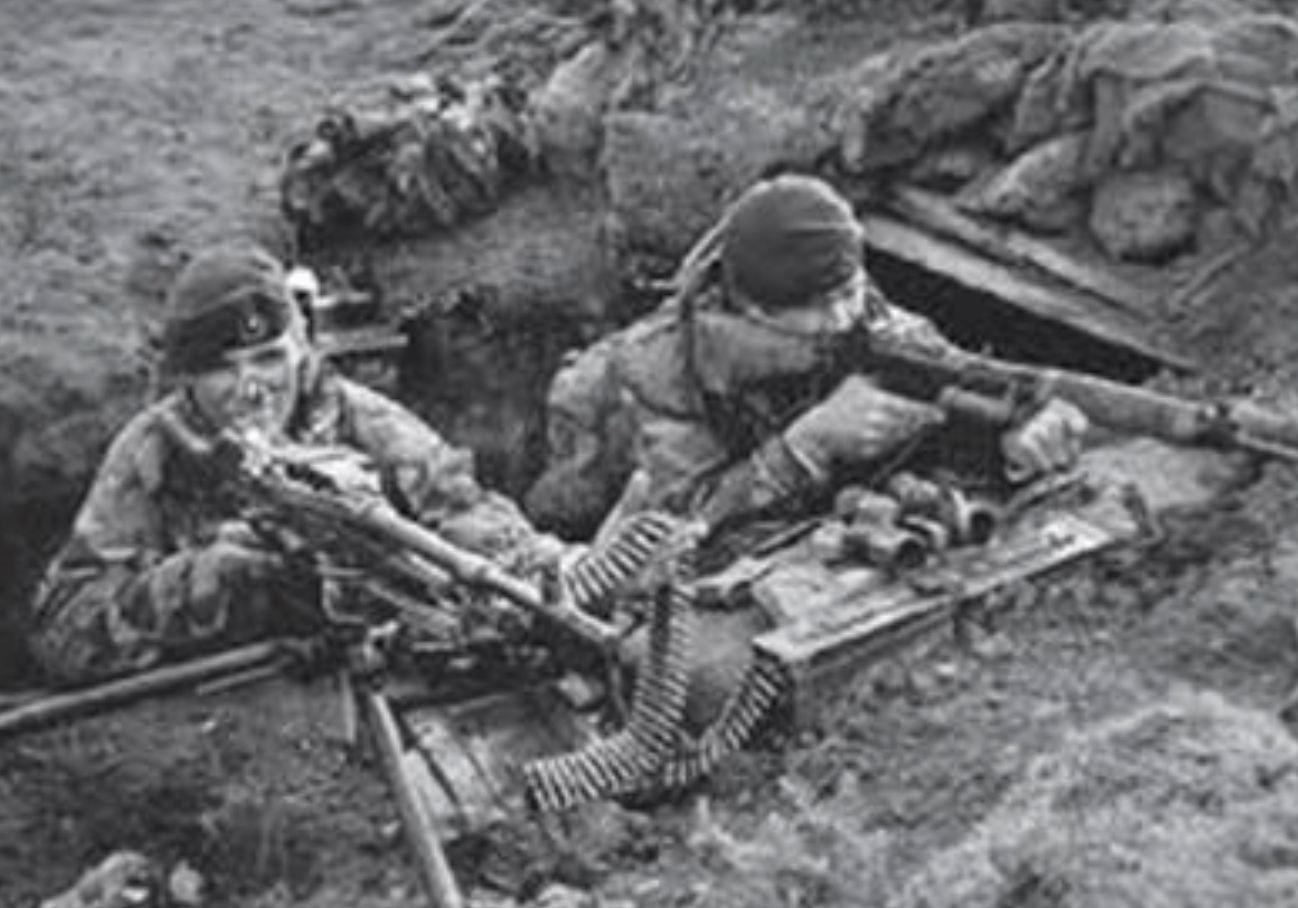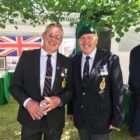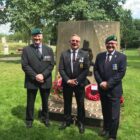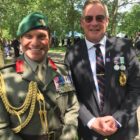This is an account of the battle of the Two Sisters Mountain by Cwmbran resident Stephen Speirs, 59, a former Royal Marine Commando with Two Troop, X company, 45 Commando during the Falklands War.
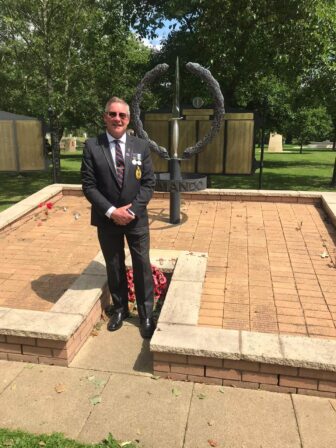
“2nd April 1982 all leave has been cancelled, all those who went on leave early need to be called back – why? Argentina have invaded the Falklands – Falklands, where the F*** is the Falklands?
“Yes at the time not many knew the location of the Falkland Islands, I believe most do now. I was with Two Troop, X Company, 45 Commando Royal Marines. The commando unit left Condor Barracks on the outskirts of Arbroath, in the north-east of Scotland, for the Falklands. This is my account of the battle of Two Sisters Mountain. However, first let me give you a brief overview of how we got there. There are many stories inbetween but those can be told at another time.
“Preparation complete, kit packed and off we flew to the Asscession Islands for additional fitness, combat readiness and weapon training while waiting for the main Task Force to catch up. We then boarded the fleet auxurliy ship RFA Stromness and sailed south for the Falklands. It is worth remembering that the kit we carried included ammunition weighed between 130 to 150 pounds depending on the amount of ammunition you were carrying plus your weapon.
“I mention this because, as we made ready for the beach landing at Ajax Bay on 21st May 1982, climbing from the ship onto the landing craft just using climbing nets made the weight of the kit carried ever more real, making ready for the beach landing at Red Beach, Ajax Bay on the north-west coast of East Falklands, all the while coming under enemy air attack, the reality was all too evident. As we approached the beach and the ramp went down – It would have been a right mess if we had come under enemy fire from the land because you couldn’t sprint or run but only waddle. Anyway, we landed safe, dug in and patrolled the area, while coming under frequent air attack.
“The long yomp beings”
“Time to move – The packs were that heavy, you had to stop every few paces to get the circulation back into your arms. Then the long yomp begins, weather – ‘bloody freezing’.
“Start of the yomp across East Falklands from Ajax Bay with all our kit. There was an 80-mile yomp across freezing ground, rocks, peat ridges, bogs, and tussock grass before 45 Commando even reached the Two Sisters. The helicopters that were supposed to ferry our kit, as well as our re-supplies and heavy stores, had been sunk on the container ship, the Atlantic Conveyor. Due to the weight, we were carrying, the pace was slow. It was decided prior to reaching Teal Inlet that we would ditch our packs (Bergen’s), carry only emergency rations. and ammunition (no sleeping bag or ration packs).
“Water re-supply was also a concern, so we filled our water bottles up with water from muddy pools or from the snow and used steri tablets to kill any germs. We just crammed what we could into light daysacks before the long march, leaving us at the mercy of the elements.
“This enabled us to speed up our yomp, first to Teal Inlet, then on to Mount Kent for the set up. If you managed to sleep it was using survival plastic bags to try and keep the cold out. However, you shivered so much that it created condensation inside the bag and that got you soaking wet. No more use of the plastic survival bag – wet and cold are not good!! We carried out patrols and set up observation posts on Mount Kent prior to forming up for the yomp to the Two Sisters Mountain.
“Suddenly, the sky’s lit up with tracer rounds”
“We started off at nightfall, carrying all the ammunition we could, along with Milan rocket shells, which we were to drop off prior to forming up at the base of the Two Sister’s mountain. We yomped all night and it was hard going through difficult terrain until we finally reached the cut- off point. To the left is Mount Longdon and to the right Mount Harriet. We dropped off the Milan shells, checked our equipment and each other’s, then formed up, waiting for the go. Suddenly, the sky’s lit up with tracer rounds and 155mm shells the assault has begun.
“It was a long, hard, and often terrifying battle fought in the bitter cold of a midwinter’s night in the South Atlantic. Decades have since passed, but I remember every detail of the assault on the mountain peaks of the Two Sisters: By June 11 we were cold, tired, and hungry, but in position. Snow began to fall just as the assault on the Two Sisters was launched.
“The snow, the freezing cold, the shouting, the rock-strewn ascent through the darkness, the red tracer bullets and exploding mortars launched by the Argentinian troops entrenched on the mountain above. With 155mm howitzer shells exploding all around us (like being in a film with the shells whistling towards you, no idea where they would land) as we ascended the slope. One Troop took the bottom section with not much resistance, Three Troop were to take the middle section.
“Then suddenly, an Argentinian machine-gun opened fire and the Marines from Three Troop launched a couple of flares from their mortar, firing back with their own machine-guns and rifles. Within seconds three Argentinian soldiers and two [Royal] Marines were dead. Other figures could be seen running on the hill to the left, and four more Argentinian soldiers fell to the accuracy of our fire.
“Bullets were flying everywhere”
“We carried on through, bayonets were fixed as I and my fellow Royal Marines colleagues of Two Troop inched up the bleak incline towards the ridge near the top, we moved into extended line prior to going over the top of the ridge and there waiting for us were three enemy machine gun positions that just opened fire on us. Bullets were flying everywhere, bouncing off rocks, and whizzing past you. We were pinned down. It was bloody. The summit was protected by Argentinian troops, well dug in.
“As we climbed the slopes of the ridge prior to the summit, we wore our green berets and prepared to go over the ridge with our helmets strapped to our webbing. I was 19 at the time and the Section Gun Commander, with Dave the Gunner and Trev is number two (ammunition feeder for the GPMG– Machine gun). I and my colleagues from Two Troop, X Company, 45 Commando took cover behind rocky outcrops and in muddy gullies, pinned down by machine gun fire, mortar and heavy artillery. It was a determined resistance by the Argentinians.
“Suddenly, there was a call for ‘left flanking’ this meant that myself and my gun team were to move forwards toward the enemy while receiving covering fire from the rest of the troop. Our training kicked straight in (Duck, down, dive, manoeuvre).
“We started a slow advance – firing then moving forward, sideways, forward, firing again. We were about 30 metres from the first Argentinian gun position receiving covering fire as we moved once more. As we opened fire with our machine gun, Trev pulled out a grenade and threw it forward, I then followed up with a second. The first machine gun fell silent, and we followed through to clear the position.
“The Argentinians knew we were close”
“We were now on the top ridge with a diagonal upward route to the summit with two machine gun positions left. With the three of us still receiving covering fire, the second gun position fell in a similar manner to the first. Heading up to the final machine gun position. The Argentinians knew we were close and pinned us down with heavy machine gun fire, with bullets flying and zipping everywhere, bouncing of the rocks in front of us and just whizzing past us.
“Trev and I had run out of grenades, but Dave had one left and passed it to me. He hated carrying grenades and the pin was spliced right round the top so that you could not pull the pin out. I got out my clasp knife and managed to loosen up the pin then pulled the pin clear. As I did my helmet dropped on the floor, both Dave and Trev thought I had dropped the grenade and started running back down the hill. Crazy as it sounds, I just burst out laughing but this was more from nerves than anything else (I almost did drop the grenade from laughing so much).
“With bullets flying everywhere, Dave and Trev managed to find cover and I managed to throw the grenade into the machine gun position – Dave and Trev came running back up the hill and we followed through to clear the final Argentinian machine gun position. My claim was to be the first British soldier to reach the top of the Two Sisters Mountain since the war had begun. We provided cover fire for the rest of Two Troop who advanced forward and joined us at the top.
“It came down to our professionalism, capability along with ferocity and superior firepower of the Royal Marines within this battle, which helped us gain the advantage. But as the Argentinians retreated, they left behind more than just a red-hot machine gun. Although as we got over the top there was no longer any signs of Argentinian forces, it was very pleasant to see piles of abandoned ration packs and warm clothing.
“A drop of whisky and a smoke”
“We opened the ration packs after being half starved and inside was a big tin of beef, crackers, miniature bottle of brandy or whisky, cigarettes, and some other items I cannot recall. Wow a full tin of beef, what delight followed by a drop of whisky and a smoke. To this day I can recall (due to my lack of not understanding Spanish) I opened a pack of crackers and spread what I thought was some sort of jam. Unfortunately for me, the so-called jam was actually a fuel that once opened and air had got to it, provided the heat to cook. That was the hottest cracker I have ever had.
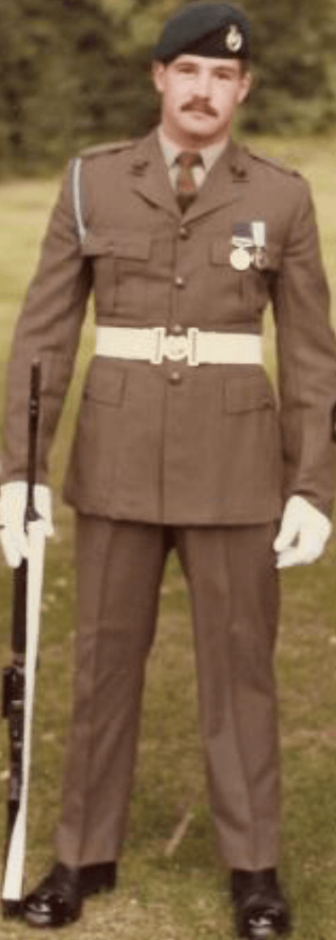
On Reflection
“The Argentinian guys up there were brave. We put down a serious amount of fire until they knew they would be overrun and then they retreated. But it was a wise decision, not a cowardly one and they left with their honour intact.
“We all recognised that, and we were grateful to have avoided more bloodshed. But we were equally grateful for what they left behind. We only had the uniforms we stood up in and the equipment we could carry, and no extra clothing or food. We were out of everything’. The battle of Two Sisters Mountain in June 1982 was successful, a small moment in history, but a strategic victory. The Gurkhas came up through to support.
“We had a bit of rest and carried on to Tumbledown Mountain, through to Sapper Hill (a mine field) then on to Port Stanley – The Argentinians had surrendered, the victory that opened the way for the liberation was ours and the Falklands Islands were once again back in British hands.”

